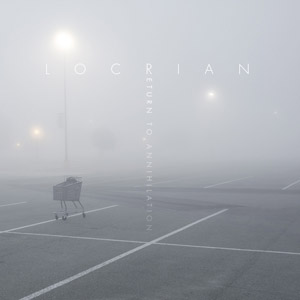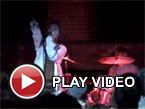Locrian, "Return to Annihilation"
 As one of the handful of truly innovative artists to spring off from the drone metal template, the trio of Locrian had previously been rather prolific, tweaking and honing their sound to something singular and unique amidst a flurry of singles and split releases. However, other than a few high profile collaborations of late (Mamiffer, Christoph Heemann), they have been rather quiet since 2011's The Clearing. Return to Annihilation, the first new material after signing to Relapse, proves that this time and effort was well spent, perfecting their sound in ways that are both more accessible, but also pushing the more abstract moments they have been working with since the beginning even further.
As one of the handful of truly innovative artists to spring off from the drone metal template, the trio of Locrian had previously been rather prolific, tweaking and honing their sound to something singular and unique amidst a flurry of singles and split releases. However, other than a few high profile collaborations of late (Mamiffer, Christoph Heemann), they have been rather quiet since 2011's The Clearing. Return to Annihilation, the first new material after signing to Relapse, proves that this time and effort was well spent, perfecting their sound in ways that are both more accessible, but also pushing the more abstract moments they have been working with since the beginning even further.
 
Most pronounced on the Territories album, as well as the collaboration with Horseback, the trio of Terence Hannum, André Foisy and Steven Hess began pushing their noise tinged sound into a more conventionally metal framework, while retaining both their sense dissonance as well as a healthy dose of early 1980s post punk.This is the same band that snuck the chords to "A Forest" into one of their earliest drone works, so this comes as no surprise.
Therefore, Hannum's synth strings, Hess' taut drumming and Foisy's grimy guitar leads on opener "Eternal Return" melding together like a doom laden cast off from New Order's Movement is no surprise.However, it is in its execution that the genius truly lies: each member’s contribution beautifully builds upon the others’, at times resembling one of the best tracks Jesu has never recorded.
The title song also carries this sensibility: a tight synth/drum lead mixed with overdriven low end and distant monastic chants.After a few minutes it all falls away to leave a beautiful electronic drone and Foisy's grinding black metal guitar before reforming as a combination of both.Here that more conventionally musical sensibility is tempered by the best elements of progressive rock, without any of the unnecessary pretense or haughty drama that are best ignored.The prog tendencies are also represented well in the 15 minute closer "Obsolete Elegies," in which up front piano and acoustic guitar are supplanted by dissonant scrapes and far off martial drumming.The '70s keyboard solos and sparse guitar that follow within the piece’s ample duration belies the closing blast of pure pounding metal.
Other moments hearken back to the band’s sparser, more experimental days, such as the pulsing analog synth and drifting guitar of "A Visitation From the Wrath of Heaven" that also builds to a beautifully bombastic climax."Panorama of Mirrors" especially feels like a throwback to their earliest releases, with the blackened guitar, noisy keyboards, and Hannum's tortured screams leading the way through bleakness and haze.A similarly repeating, mantra like sound defines "Exiting the Hall of Vapor and Light," albeit more delicate and nuanced than their older works.
The moments in which Locrian embrace melody, structure, and convention are so perfectly arranged that it feels like the natural direction they should be going in.Previous efforts where they overtly flirted with progressive and krautrock sounds were always some of my favorite works by them, so this culmination is exactly what I had hoped.However, the more accessible sounds are balanced throughout with abstraction and experimentation, recalling their past efforts with an even greater sense of refinement.
samples:
 



